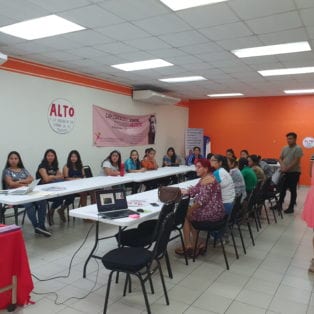Domestic workers in Honduras increasingly are exercising their rights on the job in the country, where they have few labor law protections and so are especially vulnerable to abuse. More than 100 workers recently joined SINTRAHO (Sindicato Nacional de Trabajadoras del Hogar), National Domestic Workers Union, which in October became the first legally registered domestic worker union in Honduras.
Following eight months of outreach, education, training and organizing, domestic workers formed SINTRAHO to address their difficult working conditions. Most domestic workers are women and many live in their employers’ homes, where they often are subjected to sexual harassment and other forms of gender-based violence. As in many countries worldwide, Honduran law excludes domestic workers from mandated breaks, minimum wages and access to social security.
“In Honduras, there are more than 100,000 domestic workers, and we believe that the best way for us to be heard and recognized is to organize ourselves and fight for our rights as workers in a sector that has been hidden,” says Silma Perez, SINTRAHO president.
Recognizing that most domestic workers in urban centers are internal migrants from rural areas, often from marginalized indigenous communities, leaders of FESTAGRO, the agroindustrial union federation supporting SINTRAHO, say it is especially import to support these workers as they organize for improved conditions. FESTAGRO’s confederation, CUTH, and Solidarity Center, also provide support for the new union.
Global Movement for Domestic Worker Rights
Domestic workers in Honduras are part of a worldwide mobilization of domestic workers seeking their rights, forming unions and associations, and pushing for their governments to ratify International Labor Organization Domestic Workers Convention (No. 189). Convention 189 is a binding standard in which domestic workers are entitled to full labor rights, including those covering work hours, overtime pay, safety and health standards and paid leave.
As tens of thousands domestic workers around the world mobilized around ILO 189, which was adopted in 2011, their efforts led to formation of the International Domestic Workers Federation (IDWF). Since then, domestic workers have campaigned for their governments to ratify it, and 29 countries have done so, meaning they are bound to its regulations, which include clearly stated work requirements, safe working conditions, paid annual leave and the freedom to form unions.
Costa Rica, Nicaragua and Panama are the only Central American countries that have ratified Convention 189, and SINTRAHO is planning a ratification campaign in Honduras. SINTRAHO also plans to push for greater protections for domestic workers under Honduran national labor law, including a fair minimum wage and access to social security protections.
SINTRAHO is the first national union in Honduras to specifically mention the rights of LGBTI workers in its statutes, and created an Executive Committee position for Secretary of Gender and Diversity to recognize and value its members’ diverse backgrounds.
“SINTRAHO will take on the challenge of organizing many more workers in the coming year in order to fight for national laws that will directly benefit us as domestic workers,” says Perez.

